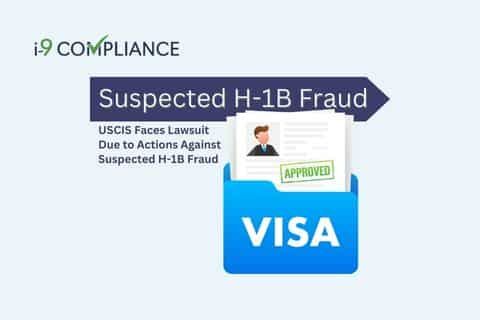USCIS Faces Lawsuit Due to Actions Against Suspected H-1B Fraud

September 07, 2023
The U.S. Citizenship and Immigration Services (USCIS) has taken steps to challenge certain petitions and issue denials based on suspicions of fraud in the H-1B lottery. According to the agency, these cases concerned beneficiaries receiving multiple registrations for the lottery. However, several beneficiaries have sued, objecting to the challenges and denials.
The current electronic H-1B lottery system allows unlimited employers to file registrations. This limitless option enables them to attempt registering the same beneficiary. However, the USCIS requires employers to make genuine offers of employment. As such, the company must hire the individual when chosen by the lottery.
The USCIS believes companies have colluded to increase their chances of receiving workers to fill a single position. This practice breaches the attestation that employers submitted beginning in Fiscal Year 2023. The attestation states the following:
“I further certify that this registration (or these registrations) reflects a legitimate job offer and that I, or the organization on whose behalf this registration (or these registrations) is being submitted, have not worked with, or agreed to work with, another registrant, petitioner, agent, or other individual or entity to submit a registration to unfairly increase chances of selection for the beneficiary or beneficiaries in this submission.”
Each year, federal law makes 85,000 cap-subject H-1B visas available for participants in the H-1B program. Because there are many more applications than visa numbers, the USCIS selects registrations using an electronic lottery system. This year, there were 780,884 applications for H-1B visas. This number marks a 61% increase over the previous year’s 483,927. Last year’s increase was 57% over the prior year’s 308,613.
Though not unprecedented in volume, the number of registrations reportedly for beneficiaries with multiple registrations has proven concerning. According to the USCIS, over half belonged to these beneficiaries. The significant increase and multiple registrations have led the USCIS to suspect fraud. As such, the agency began challenging and denying petitions they determined fraudulent.
A group of foreign nationals has challenged these actions under the Administrative Procedure Act. According to the group, they bear no responsibility for any fraud. Furthermore, they argued that they did not learn of these actions beforehand. As such, the USCIS denied them the ability to respond to these accusations of fraud.
Regardless of how this lawsuit ends, these challenges will likely cause significant changes for the next fiscal year. Before these changes happen, employers should ensure compliance, such as the employment eligibility verification (Form I-9) process. Investing in an electronic I-9 management system is the best way to succeed. This system can provide step-by-step guidance, electronic storage, and helpful reminders.
Learn more about automating your employment eligibility verification and ensuring compliance with I-9Compliance.